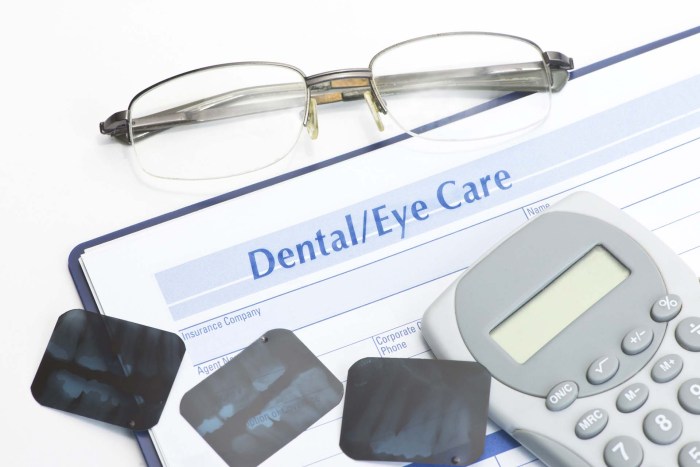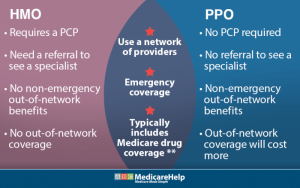
Starting with Dental and Vision Health Insurance Plans, the discussion delves into the crucial aspects of coverage, shedding light on the significance of these insurance plans in ensuring comprehensive healthcare.
Exploring the nuances of dental and vision health insurance plans, this informative piece aims to provide clarity on the key differences and benefits that come with such coverage.
Dental and Vision Health Insurance Plans
Having dental and vision coverage in health insurance plans is crucial for maintaining overall well-being. These plans help individuals access preventive care, early detection of issues, and treatment for dental and vision-related conditions, ensuring optimal health.
Key Differences Between Dental and Vision Health Insurance Plans
While both dental and vision health insurance plans focus on specific areas of health, there are key differences between the two. Dental insurance typically covers services such as cleanings, fillings, and root canals, while vision insurance includes benefits for eye exams, glasses, and contact lenses.
Dental insurance often has a focus on preventive care and restorative treatments, while vision insurance helps individuals maintain good eye health and clear vision through regular check-ups and corrective lenses.
Popular Insurance Providers Offering Comprehensive Dental and Vision Coverage
- Delta Dental: Known for its extensive network of dentists and comprehensive coverage options for various dental procedures.
- VSP Vision Care: A leading vision insurance provider offering a wide range of benefits including eye exams, glasses, and contact lenses.
- Cigna: Provides comprehensive health insurance plans that often include dental and vision coverage as part of their offerings.
Healthcare Access
Access to essential healthcare services is crucial for maintaining overall health and well-being. Dental and vision insurance plans play a significant role in improving access to these specialized services, ensuring that individuals can receive the care they need to maintain optimal oral and visual health.Individuals with dental and vision insurance coverage typically have better access to preventive services such as regular dental cleanings, eye exams, and vision screenings.
These preventive measures can help identify any potential issues early on, allowing for timely intervention and treatment. On the other hand, individuals without insurance coverage may delay or forgo these essential services due to cost concerns, leading to the progression of dental and vision problems that could have been prevented.Furthermore, dental and vision insurance plans can help individuals access specialized healthcare providers such as dentists, orthodontists, optometrists, and ophthalmologists.
These specialists have the expertise and training to address specific dental and vision issues, providing targeted treatments and interventions to improve overall oral and visual health outcomes. Without insurance coverage, individuals may face barriers in accessing these specialized providers, potentially compromising the quality of care they receive.
Improved Preventive Care
- Dental and vision insurance plans cover routine preventive services such as dental cleanings and eye exams, promoting early detection of issues.
- Individuals with insurance are more likely to seek preventive care, reducing the risk of developing serious dental and vision problems.
Access to Specialized Providers
- Insurance plans allow individuals to access specialized providers like orthodontists and ophthalmologists for targeted treatments.
- Having insurance coverage ensures that individuals can receive comprehensive care from healthcare professionals with expertise in dental and vision health.
Healthcare Costs
When it comes to healthcare costs, dental and vision insurance plans play a crucial role in helping individuals manage their expenses effectively. These insurance plans not only provide coverage for routine check-ups and treatments but also offer cost-saving benefits for preventive care.
Impact of Dental and Vision Insurance Plans
- Dental and vision insurance plans can significantly lower overall healthcare costs for individuals by covering a portion of expenses related to oral and eye care.
- By having insurance coverage, individuals are more likely to seek preventive dental and vision care, which can help detect any issues early on and prevent costly treatments in the future.
- Insurance plans often include benefits such as free or discounted preventive services like cleanings, exams, and eyeglasses, reducing out-of-pocket expenses for policyholders.
Cost-saving Benefits of Preventive Care
- Preventive dental care, such as regular cleanings and exams, can help individuals maintain good oral health and prevent costly procedures like fillings or root canals.
- Similarly, routine eye exams covered by vision insurance can detect early signs of eye conditions, reducing the risk of more serious and expensive treatments down the line.
Out-of-pocket Costs with and Without Insurance
- Individuals without dental and vision insurance coverage often face higher out-of-pocket costs for routine check-ups, treatments, and corrective eyewear.
- Without insurance, individuals may delay seeking dental and vision care due to cost concerns, leading to more advanced issues that require costly interventions.
- On the other hand, individuals with insurance coverage can access affordable preventive care, reducing the need for expensive treatments and ensuring better overall health outcomes.
Healthcare Providers

In the realm of dental and vision care services, healthcare providers play a crucial role in ensuring the well-being of patients. These professionals are responsible for diagnosing, treating, and preventing various dental and vision issues, ranging from routine check-ups to complex procedures.
Provider Networks
The network of healthcare providers available under different dental and vision insurance plans can vary significantly. Some insurance plans may have a more extensive network of dentists and optometrists, offering patients a wider range of choices when it comes to selecting a provider. On the other hand, some plans may have a more limited network, which could potentially impact accessibility and convenience for patients.
Quality of Care
Insurance plans can influence the quality of care provided by healthcare professionals in several ways. For instance, insurance companies may establish certain guidelines or requirements that providers must meet to be part of their network. These criteria could include qualifications, experience, and adherence to specific standards of care. By aligning with these requirements, healthcare providers can ensure that they are delivering high-quality services to patients covered by the insurance plan.
Health Insurance
Health insurance plays a crucial role in covering dental and vision care, providing individuals with financial protection against the high costs of treatments and services related to these areas of healthcare.
Types of Health Insurance Plans with Dental and Vision Coverage
- Employer-Sponsored Health Insurance: Many employers offer health insurance plans that include dental and vision coverage as part of their employee benefits package.
- Individual Health Insurance Plans: Individuals can purchase health insurance plans that specifically include dental and vision coverage to meet their personal needs.
- Medicare Advantage Plans: These plans, offered by private insurance companies, often include dental and vision coverage in addition to Medicare Part A and B benefits.
Tips for Choosing the Right Health Insurance Plan
When selecting a health insurance plan that meets your dental and vision care needs, consider the following tips:
- Assess Your Needs: Evaluate your dental and vision care requirements, including routine check-ups, potential treatments, and existing conditions.
- Check Coverage Limits: Review the coverage limits and exclusions for dental and vision care in the insurance plan to ensure they align with your expected expenses.
- Compare Costs: Compare premiums, deductibles, and out-of-pocket costs for dental and vision services across different insurance plans to find the most cost-effective option.
- Verify Network Providers: Confirm that your preferred dental and vision care providers are included in the insurance plan’s network to maximize coverage and minimize costs.
Health Policies
Health policies play a crucial role in determining the extent of dental and vision coverage included in insurance plans. These policies set the guidelines and regulations that insurance companies must adhere to when designing their plans, impacting the accessibility and affordability of dental and vision care for individuals.
Impact of Health Policies on Dental and Vision Coverage
Recent changes in health policies have aimed to improve the inclusion of dental and vision coverage in insurance plans. For example, the Affordable Care Act (ACA) included pediatric dental and vision benefits as essential health benefits, ensuring that children have access to necessary preventive care. Additionally, some states have passed laws requiring health insurance plans to offer standalone dental and vision coverage options.
Effectiveness of Existing Health Policies
- Existing health policies have been effective in expanding dental and vision insurance coverage for certain populations, such as children and individuals with specific health conditions.
- However, there are still gaps in coverage for adults, especially those with low incomes or who do not have access to employer-sponsored insurance.
- Health policies need to continue evolving to address these gaps and ensure that comprehensive dental and vision care is accessible to all individuals.
Health Records

Maintaining accurate health records for dental and vision care is crucial for ensuring proper treatment and follow-up care. These records provide valuable information about a patient’s medical history, previous procedures, medications, allergies, and other relevant details that can impact their current dental and vision health.
Importance of Health Records for Insurance Claims
Health records play a vital role in processing insurance claims for dental and vision services. Insurance companies rely on these records to verify the necessity of treatments, track the progression of a patient’s condition, and determine coverage eligibility. Accurate and up-to-date health records can expedite the claims process and prevent potential delays or denials.
- Include all relevant information: Make sure to document all dental and vision treatments, prescriptions, and consultations accurately in your health records.
- Keep records organized: Maintain a systematic approach to organizing your health records, whether in physical files or digital formats, to easily access and share information when needed.
- Update regularly: It’s important to update your health records regularly to reflect any changes in your dental and vision health, ensuring that insurance claims are based on the most current information available.
- Secure storage: Protect your health records from unauthorized access by storing them in a secure location, whether encrypted digital files or locked cabinets, to maintain confidentiality and privacy.
Health Screening
Regular health screenings play a crucial role in preventive dental and vision care, helping to detect potential issues early on and prevent complications down the line. These screenings are often covered by insurance plans to encourage individuals to prioritize their oral and visual health.
Coverage and Incentives
Health insurance plans may cover or provide incentives for various health screenings related to dental and vision health. These incentives can include discounted or fully covered screenings to ensure individuals are proactive about their preventive care.
- Dental Exams: Routine dental exams, cleanings, and X-rays are commonly covered by dental insurance plans. These screenings help identify cavities, gum disease, and other dental issues early on.
- Eye Exams: Vision insurance plans often cover regular eye exams to detect refractive errors, eye diseases, and other vision problems. In some cases, vision insurance may also cover a portion of the cost of prescription eyewear.
- Oral Cancer Screenings: Some dental insurance plans cover oral cancer screenings, which are essential for early detection and treatment of this serious condition.
- Glaucoma Testing: Vision insurance plans may cover glaucoma testing, a crucial screening for detecting this progressive eye disease that can lead to vision loss if left untreated.
In conclusion, Dental and Vision Health Insurance Plans play a vital role in safeguarding individuals’ well-being, offering access to essential healthcare services while also mitigating financial burdens associated with dental and vision care.
FAQ Guide
How important is it to have dental and vision coverage in health insurance plans?
Having dental and vision coverage in health insurance plans is crucial as it ensures individuals have access to essential healthcare services for their oral and vision needs.
What are the cost-saving benefits of preventive dental and vision care covered by insurance plans?
Insurance plans often cover preventive dental and vision care, leading to cost savings in the long run by addressing issues early and preventing more serious problems.
How do health policies impact the inclusion of dental and vision coverage in insurance plans?
Health policies can influence the coverage of dental and vision care in insurance plans by setting guidelines and regulations that insurance providers must follow.
What are the different types of health insurance plans that include dental and vision coverage?
Health insurance plans can vary in the extent of dental and vision coverage they offer, ranging from basic coverage to more comprehensive plans that include specialized services.







